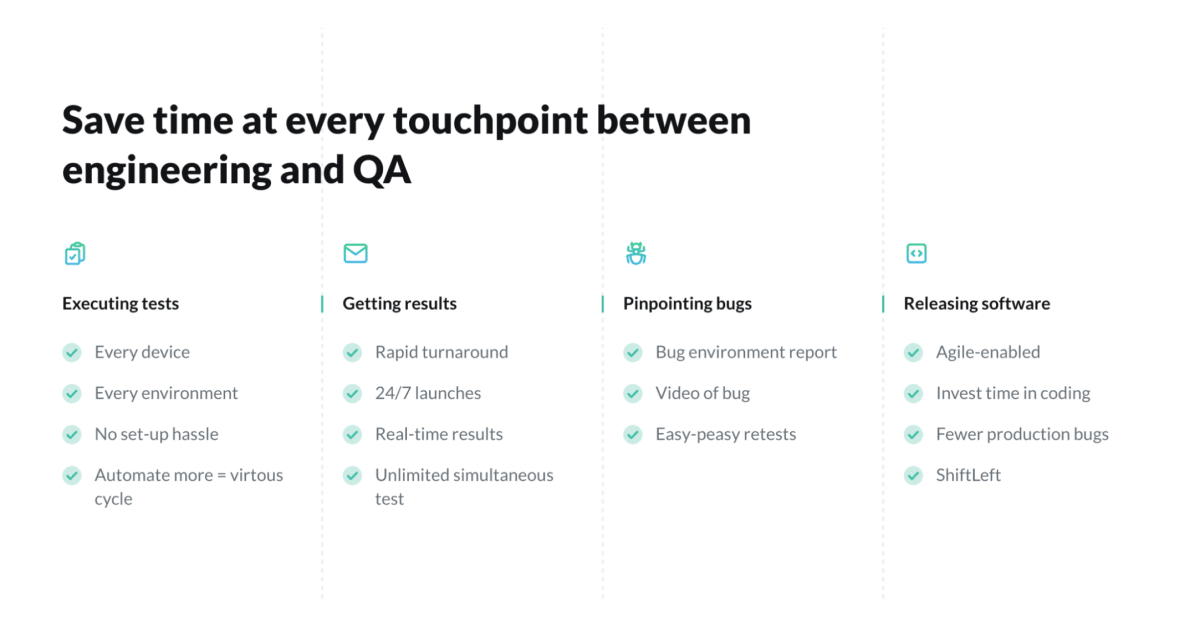7 Android Testing Tools to Consider in 2025
Remaining informed about the latest tools and practices is vital for software quality assurance and testing professionals. Sorting through the numerous solutions for Android testing can be challenging. To streamline your decision-making process, we've compiled a list of the best Android testing tools to consider in 2025. Each tool listed here aims to improve efficiency and accuracy in testing Android applications, catering to the diverse needs of developers and testers. Let's explore these options!
We can help you drive global growth, better accessibility and better product quality at every level.
How to choose the best Android testing tools?
Choosing the right Android testing tools is crucial for ensuring that your app performs optimally. Here are some factors to keep in mind when selecting Android testing tools:
- Compatibility: Ensure that the tool supports the Android operating system version you are using and that it is compatible with various devices.
- Integration: Look for tools that can integrate with your current workflow and development environment.
- Ease of use: The chosen testing tool should be easy to use and navigate.
- Performance measurement features: Tools with performance measurement features can help examine app performance bottlenecks.
- Community support: Check if the tool has a substantial support community.
7 best Android testing tools in 2025
Here is the list of best Android testing tools to consider in 2025 by our editor's choice.
1. Global App Testing – “Best in class functional and UX testing”

Take a moment to explore Global App Testing! We prioritize our offerings, and if you're exploring tools for Android testing, we'd be grateful if you'd consider including us in your shortlist of potential suppliers.
Global App Testing specializes in crowdtesting, providing a range of testing services to help developers identify application bugs and defects. With a community of over 90,000 testers worldwide, we conduct tests on real devices and software setups in over 190 countries and territories. Using our platform, you can deploy test cases and exploratory tests to your specific target audience and receive results within just 48 hours.
Fill in our form to get the pricing on your first meeting

Key features
Global App Testing offers a range of key features:
- Extensive coverage: Our testing encompasses various devices, operating systems, and networks, ensuring thorough examination in diverse environments.
- User satisfaction: We cultivate trust and satisfaction through consistent user experiences globally by preventing bugs from impacting brand interactions.
- Accelerated releases: Collaborative testing maximizes release velocity, syncing actionable results reporting with bug tracking and project management software for efficient deployment.
- Quality enhancement: Proactive identification of hidden problem areas improves overall app quality, ensuring a seamless user experience worldwide.
- Functional testing toolset: Utilize our top-tier functional testing solutions such as Exploratory Testing, Test Case Execution, and Android App Testing to address issues before deployment.
- Insightful data: Accurate test data from real users provides fresh insights, eliminating blind spots in software performance and enabling informed decision-making.
- Customized testing: Rapid test case execution within 30–150 minutes and exploratory testing results within 24–36 hours cater to your specific testing needs.
- Integration capabilities: Seamlessly integrate our testing solutions with DevOps and CI/CD tools, supporting Jira, GitHub, TestRail, and more.
- Flexible testing: With testing available for Android apps, you can adapt to your application's requirements, ensuring versatility in your testing approach.
2. Appium – “Designed to facilitate UI automation of many app platforms”

Appium is an open-source automation testing tool primarily used for mobile application testing. It allows users to automate native, hybrid, and mobile web applications across various platforms, including iOS, Android, and Windows applications. Its key feature is that it enables the testing of mobile apps without requiring modification to the source code. Appium operates as a server that receives connections from the client libraries and translates those commands into actions on the target mobile device. As of March 2024, Appium is free to use.
Key features
Some of the key features highlighted on the Appium website include the following:
- Multiple language support: It supports different programming languages, such as Java, Python, Ruby, and Javascript, for test scripting and automation API.
- Test framework support: It supports popular test frameworks like JUnit and TestNG for testing.
- UI elements locating: Appium enables the identification and location of UI elements for efficient testing.
- Emulation of user actions: Appium can emulate user actions like swiping, tapping, typing, and rotating to test the functionality and usability of mobile apps.
- Continuous testing: Continuous testing capability for faster feedback about product builds.
Extensibility: It can be extended with extra modules or scripts to suit specific testing needs.
3. Selendroid – “Test automation for native or hybrid Android apps”

Selendroid is an open-source test automation framework specifically designed for testing Android applications. It allows developers and testers to automate native and hybrid Android applications and mobile web applications using the Selenium WebDriver API. Selendroid operates as a standalone server that interacts with the Android device or emulator to automate user interactions and verify application behavior. As of March 2024, Selendroid is free to use.
Key features
Some of the key features highlighted on the Selendroid website include the following:
- Native and hybrid application support: This allows testing of native Android applications and hybrid applications built using web technologies like HTML, CSS, and JavaScript.
- Black-box testing: Enables testers to perform black-box testing without requiring access to the application's source code, ensuring a comprehensive testing approach.
- Compatibility with Selenium WebDriver: Seamlessly integrates with Selenium WebDriver, enabling developers to leverage existing automation scripts and infrastructure for testing Android applications.
- Device and emulator support: This feature supports automation on physical Android devices and emulators, providing flexibility in testing environments.
- Extensive automation capabilities: Testers can automate user interactions, perform validations, and simulate various scenarios to ensure the reliability of Android applications.
4. testRigor – “Generative AI-based test automation tool”

TestRigor, founded by Artem Golubev and Sergei Alekseev in 2017, is a modern test automation platform designed to streamline the testing process for web applications. It leverages artificial intelligence (AI) and machine learning (ML) algorithms to automate the creation, execution, and maintenance of test cases, reducing manual effort and increasing testing efficiency. As of March 2024, testRigor is available as open source, which is free to use, while private licenses are available with a 14-day trial from $900/month.
Key features
Some of the key features highlighted on the testRigor website include the following:
- AI-powered test creation: Uses advanced AI algorithms to generate test cases automatically based on application behavior and user interactions.
- Self-healing test maintenance: TestRigor's intelligent algorithms continuously monitor application changes and automatically update test cases to ensure they remain relevant and accurate.
- Natural language processing (NLP) support: This feature supports natural language input for defining test scenarios, making it accessible to both technical and non-technical users.
- Integration with CI/CD pipelines: Integrates with continuous integration and continuous deployment (CI/CD) pipelines, allowing automated tests to be triggered automatically as part of the development and deployment process.
- Real-time reporting and analytics: Provides real-time insights into test execution results, allowing teams to identify issues promptly and make data-driven decisions to improve application quality.
5. Eggplant – “Test any application or user interface with AI-powered software test automation”

Keysight's Eggplant is a test automation platform known for its innovative approach to testing digital experiences across a wide range of devices, platforms, and interfaces. It stands out for its AI-powered testing capabilities and its ability to deliver end-to-end testing solutions. According to their website, as of March 2024, they offer a quick start guided pilot program for $9,999, and it is available at such price for new users who have not had a subscription in the past 24 months. Such package includes a three-month evaluation of the Eggplant, 60 hours of hands-on guidance from experts, 5 developers, 10 executive licenses for your team, and more.
Key features
Some of the key features highlighted on the Eggplant website include the following:
- Intelligent computer vision feature: Test UI and UX with Intelligent Computer Vision. Eggplant’s automated testing uses optical character and image recognition to see from the user’s point of view.
- Universal fusion engine feature: With AI-driven test modeling from Eggplant's Universal Fusion Engine, ensure your apps, sites, and digital services work across any browser, OS, and device.
- API evaluation feature: Accelerate API evaluation for robust, on-time releases with Eggplant’s automated full-stack tests, ensuring consistency from back-end operations to the UI layer.
- Any platform testing: Run AI-powered automated tests on any platform, OS, and device.
- Model-based testing: Eggplant’s model-based testing improves application usability and reliability by predicting run-time behavior under different conditions.
- CI/CD Integrations: Eggplant integrates with Jenkins, Bamboo, GitHub, and others.
6. Mobot – “Real robots for the toughest mobile tests”

Mobot is a mobile automation testing framework developed specifically for mobile devices. Using the platform, developers can leverage native, hybrid, or mobile web applications on both Android and iOS devices. As of March 2024, Mobot is priced at $249 per month.
Key features
Some of the key features highlighted on the Mobot website include the following:
- Integration: Mobot integrates with popular Java-based test frameworks like TestNG and JUnit.
- Modular design: It offers a modular design that enables easy adaptation of functionalities.
Easy script creation: Mobot uses Java language support to create easy-to-follow automated testing scripts. - UI element locating: It has the ability to identify UI elements, making it useful for testing the functionality of mobile applications.
- Cross-platform support: Mobot works across multiple operating systems, making it versatile and highly useful for developers.
7. New Relic – “All-in-one observability“

New Relic, founded in 2008, is a software analytics platform designed to provide insights into software applications' performance and behavior. While it's not primarily a test automation tool, New Relic plays a significant role in monitoring and optimizing application performance, which is crucial for quality assurance and ensuring a positive user experience. As of March 2024, New Relic offers a free plan and multiple premium plans.
Key features
Some of the key features highlighted on the New Relic website include the following:
- Application performance monitoring (APM): Provides real-time visibility into the performance of web, mobile, and desktop applications. It helps identify bottlenecks, errors, and performance issues that may impact the user experience.
- Infrastructure monitoring: Allows organizations to monitor the health and performance of their underlying infrastructure, including servers, containers, and cloud services.
- Distributed tracing: Enables organizations to trace and visualize the flow of requests across distributed systems and microservices architectures.
- Error tracking and monitoring: Provides real-time alerts and insights into application errors and exceptions. It helps developers identify and prioritize issues that require immediate attention to ensure application stability and reliability.
- Synthetic monitoring: Allows organizations to simulate user interactions and monitor the availability and performance of web applications from multiple geographic locations.
- Real user monitoring (RUM): Captures and analyzes user interactions with applications in real-time. It provides insights into user experience metrics, such as page load times, response times, and error rates, helping developers optimize application performance and usability.
- Integrations and extensibility: Integrates with a wide range of third-party tools and services, including CI/CD platforms, issue trackers, and collaboration tools.
Which Android testing tool is perfect for you?
Thorough testing of Android applications is essential for overcoming various challenges, ensuring that the app meets quality standards, enhances user experience, and aligns with development guidelines. Selecting the right Android testing tool depends on your preferences, budget, and skill set. However, Global App Testing encompasses all the mentioned criteria. Register now to discover how GAT can elevate your Android app's quality and arrange a call with our team!
We can help you drive localization as a key initiative aligned to your business goals
FAQ
1. How do Android app testing tools improve productivity?
These tools automate testing tasks, offer insights into results, facilitate collaboration, and prioritize issues, allowing teams to focus on critical app aspects.
2. What types of testing can be performed using Android app testing tools?
Android app testing tools support functional, UI, performance, security, compatibility, and regression testing, covering various aspects of app functionality and performance.
3. What are some best practices for using Android app testing tools?
Best practices include creating comprehensive test plans, prioritizing test cases, automating repetitive tasks, incorporating real user feedback, updating test suites, and collaborating closely with stakeholders.
Keep learning
7 Mobile testing tools you should consider
The 8 best web app development software products, according to our editors
11 Mobile testing trends you need to know about
.png)